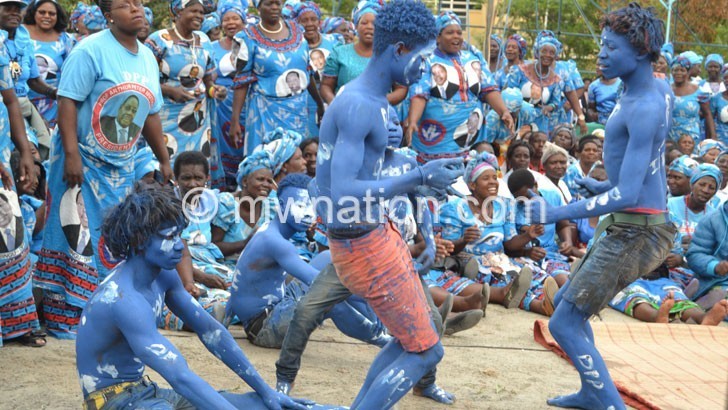Report connects DPP to violence
With 14 days to the May 21 2019 Tripartite Elections, a study on electoral conflict and violence in the country has explicitly mentioned governing Democratic Progressive Party (DPP) as the perpetrator of electoral violence.
The report, undertaken by Henry Chingaipe, Horace Chingaipe and Joseph Thombozi, has also noted an increase in inter-party violence in the run-up to the election. In contrast, the findings show that cases of violence were on the decline in previous elections.

But DPP spokesperson Nicholas Dausi, who is also Minister of Homeland Security, yesterday feigned ignorance on the matter and described the findings as “unfair”.
The researchers, commissioned by Catholic Commission for Justice and Peace (CCJP) with funding from Misereor, said violence was on the increase because DPP was orchestrating the acts.
Reads the report in part: “Inter-party electoral conflict and violence has been decreasing from one general election to another until 2014, suggesting an entrenchment of the spirit of political tolerance.
“However, as the 2019 elections approach, there is an up-turn. Inter-party violence is on the rise, mostly because of the propensity of the ruling party, the Democratic Progressive Party to deploy violence and demonstrate political intolerance of their political opponents.”
The report notes that there is “a high sense of impunity” among youth cadets, especially those from the governing parties which puts them “above the law”.
Besides, the report also observes that authorities responsible for approving campaign rally venues mostly tend to favour the governing party for fear of reprisals.
Reads the report: “The politics around notification of campaign rallies at public venues and patron-client politics fuel the occurrence of inter-party electoral conflict.
“Public and civil servants involved in approving venues for political rallies are confounded by Executive interference and fear of political reprisals to act in favour of the ruling party.”
The report recommends the need to review the electoral law to introduce penalties for political parties which sponsor electoral violence or on whose behalf acts of violence are committed or do not carry out specific actions to prevent or mitigate elements of violence.
The report also recommends promotion of issue-based politics and political tolerance among the electorate within and between political parties to minimise occurrence of political violence.
Further, it also recommends that to address the problem of venues for holding rallies, there is also a need to review the law to make sure there is no political interference when seeking permission from district commissioners (DCs).
In an interview yesterday, a furious Dausi said the study findings are untrue and a misrepresentation of the situation on the ground.
He said: “There have been a lot of these things. We have been stoned before, but you [the media] did not carry that story. We told you and you did not do it and now you are asking me because someone is talking evil about DPP? This is not true and it is not correct.”
Ironically, The Nation edition of April 17 published a story on page four which quoted Dausi as accusing opposition Malawi Congress Party (MCP) supporters of perpetrating violence against DPP in Mchinji when President Peter Mutharika held whistle-stop campaign rallies.
Dausi visited Nation Publications Limited (NPL) offices in Blantyre to grant an interview on the purported violence against DPP. But MCP secretary general Eisenhower Mkaka distanced his party from the same.
In a separate interview yesterday, governance commentator Rafiq Hajat said the DPP was living in denial by denying its alleged involvement in violence.
He said: “Obviously, do you expect them to accept? They will not. They will deny it because everybody is denying, but we all know it is happening. So, rather than pointing fingers at each other, let us tackle the problem.”
Hajat said one of the ways to tackle political violence is by strengthening multiparty liaison committees and ensuring that the national peace architecture is strengthened by including civil society organisations (CSOs) with experience in peace talks.
Reacting to the study findings in an interview, Mzuzu-based political commentator Emily Mkamanga said despite the DPP dismissing the findings, the reality on the ground is that the party in power is orchestrating violence.
She said: “There is a tendency that whatever they [DPP] do is right and even their supporters have got this idea and they are backing those people who are perpetrating violence. But then everyone knows that in this country, the party which has the most violent supporters is them.”
The study collected data from four general elections, notably 2004, 2009, 2014 and the forthcoming May 21 Tripartite Elections through literature review and interviews.
In August last year, our sister newspaper Weekend Nation conducted an analysis which indicated that about 90 percent of political violence cases are failing to be acted upon since 2014.
The analysis established that out of 15 incidents of violence reported in the media which occurred between 2014 and 2018, police had acted only on one incident which involved opposition political parties while those linked to DPP have been largely ignored. But in an earlier response, National Police spokesperson James Kadadzera said the police were acting on all issues reported to them regardless of party affiliation.





